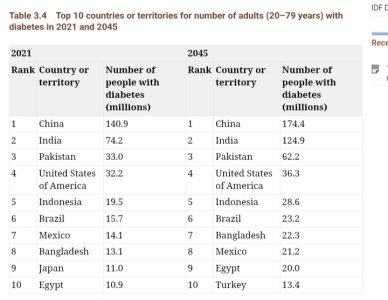Bhaijaan
Hall of Famer
- Joined
- Jan 10, 2011
- Runs
- 70,092
- Post of the Week
- 1
I just came across some data about the Diabetes situation in Pakistan and it blew my mind.
According to the International Diabetes Federation (IDF, 2023), a staggering 33 million people in Pakistan now live with diabetes. That’s 26.7% of the adult population — the highest in the world.
What makes this worse is that nearly half of diabetics in Pakistan remain undiagnosed. By the time they reach a clinic, complications have often set in.
The situation is much worse with adult women.
Pakistan needs to seriously address its dietary habits and government regulations wrt control of harmful ingredients that trigger Diabetes.
A 45-year-old diabetic in Pakistan today may spend the rest of their life on dialysis, insulin, or worse — in complete disability. The economic cost is devastating for families already struggling with inflation and job insecurity.
More worryingly, type-2 diabetes is now being diagnosed in teenagers and young adults, once considered rare.
I don't know if there's a corelation but things are as worse in Kuwait, Saudi, Egypt, Qatar etc who all have prevalence rates exceeding 20%.
Global rate is 9% roughly and the two most populated nations have it in the range of 11-12%
According to the International Diabetes Federation (IDF, 2023), a staggering 33 million people in Pakistan now live with diabetes. That’s 26.7% of the adult population — the highest in the world.
What makes this worse is that nearly half of diabetics in Pakistan remain undiagnosed. By the time they reach a clinic, complications have often set in.
The situation is much worse with adult women.
Pakistan needs to seriously address its dietary habits and government regulations wrt control of harmful ingredients that trigger Diabetes.
A 45-year-old diabetic in Pakistan today may spend the rest of their life on dialysis, insulin, or worse — in complete disability. The economic cost is devastating for families already struggling with inflation and job insecurity.
More worryingly, type-2 diabetes is now being diagnosed in teenagers and young adults, once considered rare.
“We’re seeing 18-year-olds with blood sugar levels that used to appear only in the elderly,” says Dr. Muhammad Abbas, endocrinologist at Aga Khan Hospital.
“Fast food, no exercise, and zero awareness — it's a recipe for disaster.”
I don't know if there's a corelation but things are as worse in Kuwait, Saudi, Egypt, Qatar etc who all have prevalence rates exceeding 20%.
Global rate is 9% roughly and the two most populated nations have it in the range of 11-12%






